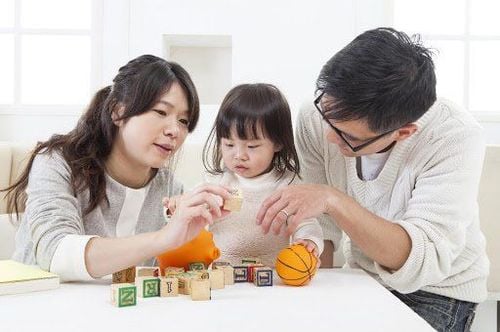This is an automatically translated article.
Playing with friends is a way for children to learn social norms, such as teaching children about sharing and tolerance, resilience, confidence, and problem solving. If your child seems shy and has few friends, there are a few ways to help him make friends.1. Organize fun sessions
Children's activities give a shy child a head start in social life. Child development experts say: If there is a positive experience, your child is more likely to want to participate again.To help children make friends happily at home, you can apply a few principles as follows:
Start with a small group At first, you only need to invite 1-2 small friends to your home, best. are children your child already knows and is about his or her age. An older child can also join to act as a game manager and create lots of fun games for the little ones.
Short Playtime 1 - 2 hours of playtime is too much for children this age. If playing for longer, the baby will be overstimulated, leading to difficulty sleeping well at night or other disturbances in life.
Plan ahead Prepare some games and activities that your child enjoys to help them make friends more comfortable and feel good about themselves. To get off to a good start, make sure you have plenty of toys on hand, so the kids don't have to fight each other.
Get involved Don't just leave the kids playing alone, stay out and hope for the best. Your guidance will help the kids feel more comfortable with each other, especially if they're just getting to know each other.
Be prepared for the bad You need to think of all the unfortunate cases if the kids get into a conflict, lose focus and stop playing or change to another activity. Supervise children as they paint, sculpt, play hide-and-seek or play in the pool. However, try not to overwhelm or control the kids too tightly. Let them be creative, play in safety and comfort.
Stick to a familiar schedule Try to bring your child to children's activities, or organize them at home with old friends on a weekly schedule. If all goes well, change locations to a park, playground, or another friend's house. If the get-together goes really well and your child seems independent, try letting her come over to your house or go out on her own, unsupervised. First for a short time and then for a longer time.
Make friends with children Parents often make friends with children to stimulate interaction, and at the same time learn about children's attitudes when playing. You can understand when your child is having a hard time and what's easy. For example, if puzzles and games that require concentration are discouraging your child, don't let them engage in too much.

Bố mẹ làm bạn với trẻ để kích thích sự tương tác và tìm hiểu thái độ khi chơi của con
2. Adopt a pet
Some young children are not ready to play with their peers. If your child just clings to you and won't let go, consider adopting a pet to be friends with. When playing with pets, children need social and often non-threatening interactions that help them feel safe and open up about their feelings.A pet is also a topic for children to start conversations with other friends. Your child can take his hamster to daycare to show his friends, or approach and compare his dog with another friend's pet at the park.
However, before bringing in a pet, you should consider how much your child can help you with pet care.
3. Be a role model for children
In fact, making friends is like a skill to learn. There will be children who are not yet proficient and need to see firsthand how it is done. A simple way to show your child that making friends is fun is to watch a video together or read a children's book about friendship.Besides, parents should also have their own friends. Young children pay close attention to what adults do and imitate, so set an example for your child by hanging out with friends, especially hanging out with a friend who also has kids.
Let your child see you as friendly and outgoing when talking on the phone, or when talking to neighbors or people at the grocery store. When the opportunity arises, be friendly and interact with children your own age, and your baby will notice that other children are more than happy to respond with an effort to get to know each other.

Nếu con chỉ bám vào bố mẹ không chịu rời, hãy cân nhắc nhận nuôi một thú cưng để làm bạn với trẻ
4. Let your child practice try
You can boost self-confidence by exposing your child to new environments where he will have to learn to fit in gradually. If you regularly go to the grocery store with your child, encourage them to help you at checkout, then choose and pay for their own food. Or you can just sit in one place on the playground and let your child gradually find where other children are playing.At home, try using puppets to act out friends. Parents' puppets can ask familiar questions such as: "Friend Bear, what are you getting from the tree? Can I help?".
You can also role-play yourself, re-enacting a situation that made your child feel embarrassed, such as playing with another child on a swing in the park. You will play the role of the stranger and let him practice how to get along with new friends.

Bạn có thể nâng cao sự tự tin bằng cách cho con tiếp xúc với những môi trường mới
5. Keep expectations close to reality
3-year-olds will interact more with other children, but younger children mainly play with you sitting next to, or imitating each other, not playing directly.If your child is not ready to make more friends, your parents' good intentions to help children make friends will backfire. Children may feel unsafe around other children, and pressure from parents can make them insecure. Your child may be afraid of disappointing you or not like having to fight or argue when he has friends.
Parents should not push and interfere too much in making friends, but just create a premise. Your child may be shy or cautious by nature, which is not necessarily a bad thing. Instead of trying to change your child's personality, you can help her feel more comfortable approaching new friends. It's important to help your child make friends in small, gentle steps, just encouraging but not pushing.
In most cases, shyness or difficulty making friends as a child is normal. But if by age 3 your child rarely makes eye contact, is unusually withdrawn, doesn't want to play with other kids, seems scared to go to preschool or the playground, talk to your doctor to figure out what's going on. What is the real problem to get timely treatment.
As a key area of Vinmec Health System, Pediatrics Department is well-invested in personnel, technology, and equipment, bringing satisfaction to customers.
Top team of pediatric experts: Experienced professors, associate professors, doctors, and masters, who have worked at major hospitals across the country, are well-trained at home and abroad; understand child psychology. Comprehensive services: Vinmec provides a series of continuous medical examination and treatment services from Newborn to Pediatric and Vaccine,... according to international standards to help parents take care of their baby's health from birth to adulthood. Advanced techniques: Vinmec has successfully deployed many specialized techniques to make the treatment of difficult diseases in Pediatrics more effective: neurosurgery - skull surgery, hematopoietic stem cell transplantation in cancer treatment ,.... Professional care: Understanding children's psychology, building a play space for children, helping them feel comfortable and familiar with the hospital's environment, cooperating in treatment, improving effectiveness of medical treatment. To register for examination and treatment with Pediatricians at Vinmec International General Hospitals nationwide, please click the "Contact" button on the website or register for an online examination.
Please dial HOTLINE for more information or register for an appointment HERE. Download MyVinmec app to make appointments faster and to manage your bookings easily.
Reference source: babycenter.com












